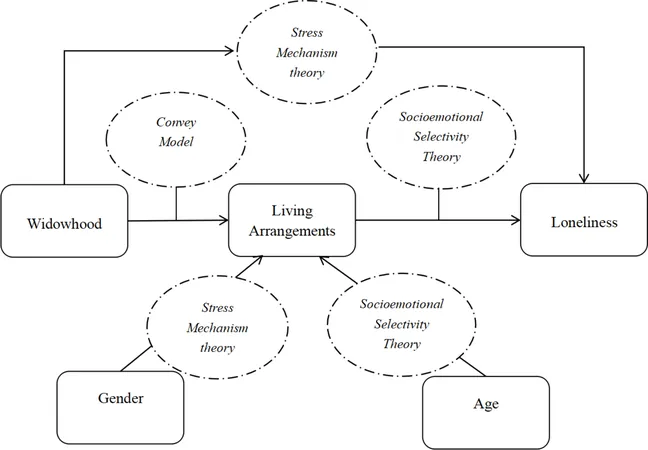
Understanding the Impact of Widowhood on Loneliness in Older Adults: The Role of Co-residence with Children
2024-09-25
Introduction
Loneliness has emerged as a pressing public health concern, particularly among the elderly. Numerous studies have confirmed a stark relationship between loneliness and increased mortality risk in older adults, attributed to factors as alarming as those associated with smoking and obesity. Findings indicate that elderly individuals experiencing loneliness are at a 9% higher risk of premature death. Moreover, loneliness can exacerbate feelings of grief and depression, heightening the urgency for interventions aimed at improving mental well-being among older populations.
Widowhood as a Risk Factor
Widowhood is a critical risk factor for loneliness, with extensive research highlighting the emotional toll faced by bereaved spouses. When a partner passes away, the loss of companionship and daily interactions can create a significant void, often resulting in increased feelings of isolation. The stress mechanism theory posits that widowhood is a profound life stressor that can dramatically affect an individual’s mental state. While women generally show greater resilience in coping with the death of a spouse, variations exist in how different individuals adapt to these changes, influenced by factors such as social support systems and new living arrangements.
Living Arrangements and Loneliness
One particular area of interest is the role of living arrangements following the loss of a spouse and how these arrangements can mediate feelings of loneliness. Research indicates that older adults who co-reside with their children often experience less loneliness than those who live alone. This perspective aligns with the socioemotional selectivity theory, which suggests that aging individuals prioritize emotionally fulfilling relationships, making the presence of family particularly significant in mitigating feelings of isolation.
Cultural Factors
Interestingly, cultural factors also play a substantial role in shaping living arrangements and the emotional well-being of older adults. In China, for instance, traditional values of filial piety lead to higher rates of adult children living with their elderly parents, thereby potentially providing critical social support. However, as societal norms evolve and urban migration increases, these family structures may be under strain, raising concerns over the loneliness of older adults.
Research Aims
Our current study seeks to establish the relationship between widowhood, co-residence with children, and loneliness among older adults in China. Leveraging data from the Chinese Longitudinal Healthy Longevity Survey, we aim to analyze how living arrangements function as a mediating factor in loneliness experienced by the widowed. Our examination seeks to uncover whether the effects of living arrangements differ based on gender and age, with expectations that women and younger widows would benefit more from living with family post-bereavement.
Policy Implications
Moreover, this investigation highlights the need for policymakers to consider the importance of supportive living arrangements as a means to improve the quality of life for elderly individuals facing significant emotional challenges after the loss of their spouse.
Conclusion
As we delve deeper into the nuances of how widowhood and living conditions inform feelings of loneliness among the elderly, it is essential to employ a comprehensive approach that includes both quantitative assessments and qualitative insights. Future research endeavors should focus on broadening the scope of living arrangements considered, supplementing with detailed personal narratives, and examining the intricate dynamics of familial support systems.
In conclusion, addressing loneliness and its impacts on older adults, particularly those undergoing the profound transition of widowhood, calls for a nuanced understanding of cultural, social, and personal factors. Our study promises to pave the way for effective interventions, enhancing support for vulnerable populations in China and beyond. Key stakeholders are urged to prioritize the empowerment of intergenerational living arrangements as a pivotal strategy in combating loneliness among the elderly.


 Brasil (PT)
Brasil (PT)
 Canada (EN)
Canada (EN)
 Chile (ES)
Chile (ES)
 España (ES)
España (ES)
 France (FR)
France (FR)
 Hong Kong (EN)
Hong Kong (EN)
 Italia (IT)
Italia (IT)
 日本 (JA)
日本 (JA)
 Magyarország (HU)
Magyarország (HU)
 Norge (NO)
Norge (NO)
 Polska (PL)
Polska (PL)
 Schweiz (DE)
Schweiz (DE)
 Singapore (EN)
Singapore (EN)
 Sverige (SV)
Sverige (SV)
 Suomi (FI)
Suomi (FI)
 Türkiye (TR)
Türkiye (TR)